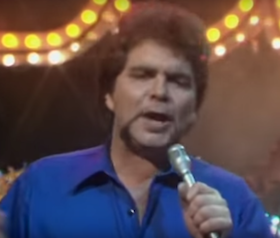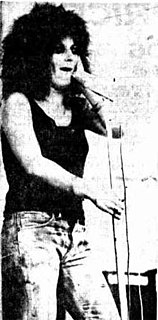Related Research Articles
Pub rock is a style of Australian rock and roll popular throughout the 1970s and 1980s, and that was still influencing contemporary Australian music in the 2000s decade. The term came from the venues where most of these bands originally played — inner-city and suburban pubs. These often noisy, hot, small and crowded venues were not always ideal as music venues and favoured loud, simple songs based on drums and electric guitar riffs.
Maxwell James Merritt was a New Zealand-born singer-songwriter and guitarist who was renowned as an interpreter of soul music and R&B. As leader of Max Merritt & The Meteors, his best known hits are "Slippin' Away", which reached No. 2 on the 1976 Australian singles charts, and "Hey, Western Union Man" which reached No. 13. Merritt rose to prominence in New Zealand from 1958 and relocated to Sydney, Australia, in December 1964. Merritt was acknowledged as one of the best local performers of the 1960s and 1970s and his influence did much to popularise soul music / R&B and rock in New Zealand and Australia.
Billy Thorpe and the Aztecs were an Australian rock band formed in Sydney, New South Wales. The group enjoyed success in the mid-1960s, but split in 1967. They re-emerged in the early 1970s to become one of the most popular Australian hard-rock bands of the period. Thorpe died from a heart attack in Sydney on 28 February 2007.
Vincent Melouney (Maloney) is an Australian guitarist, vocalist, and songwriter best known as an official member of The Bee Gees from 1967 to 1969 during the group’s initial period of worldwide success.
The Wild Cherries was an Australian rock group, which started in late 1964 playing R&B/jazz and became "the most relentlessly experimental psychedelic band on the Melbourne discotheque / dance scene" according to commentator, Glenn A. Baker.

William Richard Thorpe AM was an English-born Australian singer-songwriter, and record producer. As lead singer of his band Billy Thorpe & the Aztecs, he had success in the 1960s with "Blue Day", "Poison Ivy", "Over the Rainbow", "Sick and Tired", "Baby, Hold Me Close" and "Mashed Potato"; and in the 1970s with "Most People I Know Think That I'm Crazy". Featuring in concerts at Sunbury Pop Festivals and Myer Music Bowl in the early 1970s, the Aztecs also developed the pub rock scene and were one of the loudest groups in Australia.
Buffalo was an Australian rock band formed in August 1971 by founding mainstay Dave Tice on lead vocals (ex-Head). Fellow founders, also from Head, were Paul Balbi on drums, John Baxter on guitar, and Peter Wells on bass guitar; together with Alan Milano on lead vocals (ex-Mandala). Milano left after their debut album, Dead Forever..., and Balbi was replaced on drums by Jimmy Economou. Their next two albums, Volcanic Rock and Only Want You for Your Body, were also issued by Vertigo Records. After 1975 line-up changes resulted in a more commercial sound and the group disbanded in March 1977. Australian musicologist Ian McFarlane noted that there was "nothing subtle about Buffalo's primal, heavyweight sound, but it was delivered with a great deal of conviction ... combining the dense, occult riffing ... with the progressive blues chops ... the band certainly captured the arrogant disposition of the times in a bold and thunderous fashion". Alongside Billy Thorpe & The Aztecs and Blackfeather, Buffalo pioneered Australia's heavy metal, pub rock and psychedelic rock movements. Peter Wells died on 27 March 2006, aged 58.
Blackfeather are an Australian rock group which formed in April 1970. The band has had numerous line-ups, mostly fronted by founding lead singer, Neale Johns. An early heavy rock version recorded their debut album, At the Mountains of Madness, which peaked at number seven on the Go-Set Top 20 Albums chart. It provided the single, "Seasons of Change", which was co-written by Johns with lead guitarist, John Robinson. In July 1972 a piano-based line-up led by Johns issued an Australian number-one single, "Boppin' the Blues".

Lobby Loyde, also known as John Barrie Lyde or Barry Lyde, was an Australian rock music guitarist, songwriter and producer.

Douglas John Parkinson was an Australian pop and rock singer. He led the bands Strings and Things/A Sound (1965), the Questions (1966–1968), Doug Parkinson in Focus, Fanny Adams (1970–1971), the Life Organisation (1973), Southern Star Band (1978–1980) and Doug Parkinson Band (1981–1983). Doug Parkinson in Focus's cover version of the Beatles' track "Dear Prudence" peaked at No. 5 on the Go-Set National Top 40. The follow up single, "Without You" / "Hair" (October), also reached No. 5. Parkinson released solo material and performed in musical theatre productions.

Bee Gees' 1st is the third studio album by English band Bee Gees, and their first international full-length recording after two albums distributed only in Australia and New Zealand. Bee Gees' 1st was the group's debut album for the UK Polydor label, and for the US Atco label. Bee Gees 1st was released on 14 July 1967 in the UK. On 9 August it entered the UK charts; on that same day, the album was released in the US, and it entered the US charts on 26 August.

Duncan Hazlett McGuire, was an Australian musician, songwriter, recording engineer and producer. McGuire was a founding member of the jazz fusion band, Ayers Rock from 1973 until he left in 1976. As a bass guitarist he appeared in several of Parkinson's groups including the Questions (1965–1968), Doug Parkinson in Focus (1968–1969) and the Southern Star Band (1978–1981). He went into music production in the early 1980s, in October 1980 he co-produced and engineered the debut self-titled album by Australian rock band, INXS. Duncan McGuire was diagnosed with lung cancer; and died in July 1989 of an associated brain tumour, aged 46.

Wendy June Saddington, also known as Gandharvika Dasi, was an Australian blues, soul and jazz singer, and was in the bands Chain, Copperwine and the Wendy Saddington Band. She wrote for teen pop newspaper Go-Set from September 1969 to September 1970 as an agony aunt in her weekly "Takes Care of Business" column, and as a feature writer. Saddington had Top 30 chart success with her 1972 solo single "Looking Through a Window", which was written and produced by Billy Thorpe and Warren Morgan of the Aztecs. After adopting Krishna Consciousness in the 1970s she took the name Gandharvika Dasi. In March 2013 she was diagnosed with oesophageal cancer, and died on 21 June, aged 63.
Levi Smith's Clefs, originally The Clefs, were an Australian R&B, pop rock group, which formed in Adelaide in 1963. Lead vocalist, Barrie "The Bear" McAskill, joined in 1965. In 1967 he took over and renamed the group after founding keyboardist, Winston "Tweed" Harris, left. They released a sole studio album, Empty Monkey, in March 1970 and underwent numerous line-up changes until they disbanded in 1972. After their time in the band various members formed the groups: Tully, Fraternity and Southern Contemporary Rock Assembly (SCRA). Winston Harris (1941–2004) died of throat cancer, aged 63. A drummer from 1970 to 1971, Russell Dunlop (1945–2009), died after a seizure, aged 63. Richard Lockwood, flautist and saxophonist in 1968, died in 2012 of bowel cancer.
Philip John Manning is an Australian blues singer-songwriter and guitarist. Manning has been a member of various groups including Chain and has had a solo career. As a member of Chain, Manning co-wrote their January 1971 single "Black and Blue" which became number one on the Melbourne charts and also Judgement, which reached number two in Sydney. The related album, Toward the Blues followed in September and peaked in the top 10 albums chart.

James Vivian Alfred Doyle was an Australian musician, radio presenter and songwriter. He was the founding mainstay guitarist in Ayers Rock (1973–81), a jazz fusion, progressive rock band. As a member of Ayers Rock, Doyle appeared on all three of their studio albums, Big Red Rock (1974), Beyond (1976) and Hotspell (1980). They toured both nationally and internationally including through the United States, where they supported Bachman–Turner Overdrive at a stadium concert with an audience of 35,000 people in Seattle. For the group's third album, Hotspell, Doyle wrote or co-wrote four tracks.
Leo de Castro was a New Zealand funk and soul singer-guitarist. From 1969 to 1995 he worked in Australia in a variety of bands before returning to Auckland. He contributed to Rocco (1976), as a member of Johnny Rocco Band; Voodoo Soul – Live at The Basement, by Leo de Castro and Friends; a live album, Long White Clouds (2007), which had been recorded in January 1988 using two separate backing bands, The Dancehall Racketeers and Roger Janes Band.

Mark Kennedy is an Australian musician who has been the drummer for several artists including Spectrum (1969–70), Doug Parkinson in Focus (1971), Leo de Castro (1971–73), Ayers Rock (1973–76), Marcia Hines (1976–83), Men at Work (1985), Renée Geyer and Jimmy Barnes (2005).
Raymond Hough, who performed as Ray Hoff, was an Australian rock 'n' roll and R&B singer from the late 1950s to mid-1970s. He led Ray Hoff & the Off Beats from 1959 to 1967, which issued a self-titled album. During the early 1970s he was a member of Perth-based blues revival group, Likefun. After his music career he became an auto detailer. In 2005 he was diagnosed with cancer, subsequently he had two strokes and died on 19 March 2010, aged 67.
Galadriel were an Australian progressive rock group formed in 1969 by Garry Adams on guitar and vocals, Doug Bligh on drums, Gary Lothian on lead guitar, Mick Parker on bass guitar and flute, and John "Spider" Scholtens on lead vocals. According to Australian musicologist, Ian McFarlane, their debut self-titled album from May 1971 is, "one of the rarest major label progressive rock albums of the early 1970s... songs ranged in style from bluesy hard rock to jazzy ballads ." The group broke up in 1972. Galadriel was re-released in 1995, on CD, by Vicious Sloth Collectables.
References
- 1 2 3 4 5 6 7 8 9 10 11 12 13 14 15 McFarlane, Ian (1999). "Encyclopedia entry for 'Fanny Adams'". Encyclopedia of Australian Rock and Pop . St Leonards, NSW: Allen & Unwin. ISBN 1-86508-072-1. Archived from the original on 3 August 2004.
- 1 2 3 4 5 6 7 8 9 Kimball, Duncan (2002). "Fanny Adams". Milesago: Australasian Music and Popular Culture 1964–1975. Ice Productions. Archived from the original on 23 June 2003. Retrieved 18 December 2016.
- 1 2 3 4 Nichols, David (2016). "The Early to Mid Seventies: It's a Flash!". Dig: Australian Rock and Pop Music, 1960-85. Verse Chorus Press. pp. 205–7. ISBN 978-1-89124-161-1 . Retrieved 18 December 2016– via Google Books.